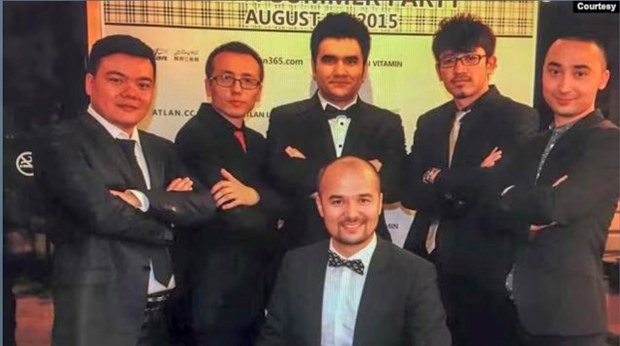Kasim Kashgar (center front) is photographed with, from right, Semet Ababekri, Abdukadir Rozi, Akber Osman, Mirkamil Ahmed and Mehmut Abdukeyum, during a school party in Urumqi in August 2015. Photo provided by Kasim Kashgar
2024.06.07
Authorities in Xinjiang have sentenced five Uyghur former colleagues of a Voice of America journalist to at least seven years in prison because of their links to him, said Kasim Kashgar, who has worked for the government-funded news organization since 2019.
The jailed men include Mirkamil Ahmed, Semet Ababekri, Abdukadir Rozi, Mehmut Abdukeyum and Akber Osman, he told Radio Free Asia, a sister organization of VOA, which reported their imprisonment on Wednesday.
Kashgar said he found out about their imprisonment in May from people who traveled overseas and who knew details and had proof about his friends’ arrests.
They told him that the men had been accused of being members of terrorist and separatist organizations.
The men had worked with him at a language school Kashgar established in Xinjiang’s capital Urumqi, he said.
The five were all arrested around April and May 2021, said Kashgar, who fled from Xinjiang in May 2017 and arrived in the United States that October.
“Their arrest was not a random occurrence,” Kashgar said. “These individuals have committed no crimes.”
Accused of recruiting for WUC
Through his contacts, Kashgar learned that Chinese authorities claimed that he had secretly tried to recruit the five men to join the World Uyghur Congress, or WUC, a Germany-based organization that advocates for the rights of the predominantly Muslim Uyghurs. About 11 million live in the Xinjiang Uyghur Autonomous Region, which Uyghurs prefer to call East Turkestan.
Kashgar, who reports on Uyghur human rights for VOA, sometimes interviews members of the organization. But the accusation that he tried to get the five men to become members of the WUC, is “a blatant lie and slander,” said Zumretay Arkin, the group’s spokesperson and global advocacy director.
WUC doesn’t know the individuals or have connections to them, she said.

Uyghur doctoral student Abduqadirjan Rozi (2nd from L) receives an award from officials at Sun Yat-sen University in Guangzhou, southern China's Guangdong province, in 2018. (Sun Yat-sen University)
“It is widely known within the Uyghur diaspora that people are often arrested based on false accusations of being linked to the WUC, with some even being forced to become spies,” Arkin said.
“This recent arrest is yet another instance of the CCP’s transnational repression policies,” she said referring to the Chinese Communist Party.
VOA spokeswoman Bridget Serchak declined RFA’s request for an interview.
Arbitrary arrests
The arrests of Kashgar’s former colleagues in 2021 came at a time when Chinese government authorities were arbitrarily arresting and detaining numerous Uyghur intellectuals, businessmen and cultural and religious figures, purportedly to prevent religious extremism and terrorist activities.
“The Chinese government continues to call for the normalization of counterterrorism policies in the Uyghur region,” Kashgar said. “The unlawful arrests and torture persist to this day.”
RFA previously reported that authorities arrested one of the men, Abdukadir Rozi in 2021 while attending Sun Yat-sen University in the southern Chinese city of Guangzhou.
The graduate management student, 35 years old at the time, had been praised in the Chinese media and known for his academic accomplishments.
After Kashgar fled from Xinjiang in 2017 and posted on social media that he was living in the United States, his colleagues back home, including the five men, cut ties with him.
The Chinese government demanded his immediate return to manage the language school because he was still its legal representative.
“They demanded that I return within a few weeks or the school would be shut down,” he said.
When Kashgar informed them that he would not return, they closed the school at the end of 2017.
Translated by RFA Uyghur. Edited by Roseanne Gerin and Malcolm Foster.
RFA, 2024.06.07

